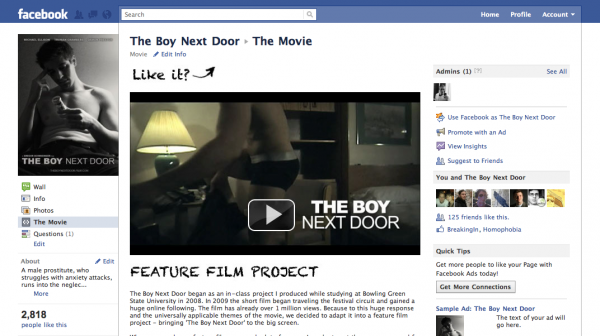How to Reach a Million Video Views, Part 5 – Talking Business

- Nino Leitner
- On May 7, 2011
- http://www.ninofilm.net
This is the last part of a series of guest blog posts by the screenwriter and director Gregor Schmidinger who tries to reveal the mystery about how to reach a million views with a (narrative) short film on the Internet.
Previous Posts:
• How to Reach a Million Video Views, Part 1: The Set Up
• How to Reach a Million Video Views, Part 2: The Art of Filmmaking
• How to Reach a Million Video Views, Part 3: Ancient Heritage
• How to Reach a Million Video Views, Part 4: Emotions and Meaning
After a very artsy perspective on the topic of filmmaking, we jump right into the nuts and bolts of the business. My opinion is that the business aspects are as important as the story. There are a lot of great movies out there that most people won‘t hear about simply because they don‘t know how to reach their audience. And what use does an unseen movie have? Just to be clear, all the best business measures won’t turn a bad movie into a great one. We can experience that with a lot of Hollywood movies: Great trailer but disappointing movie. We are clearly not aiming for that.
KNOW YOUR AUDIENCE
I still do remember my production and distribution class back when I was at Bowling Green State University. One of the mantras our lecturer constantly repeated was to know your audience. I did hear the words but I guess I didn‘t grasp the importance of them. It all really boils down to identifying your audience.
Now I can hear my past me arguing „But my movie should be appealing to everybody“. Guess what, if your movie wants to be appealing to everybody then it won‘t appeal to anybody. The worst you can do is to try and satisfy as many different people as possible. Try that and I guarantee you that you‘ll fail 99% of the time. I had to learn it the hard way with my diploma thesis project „Borderline“.
The reason why I was repelled by the idea of identifying an audience was that I artificially tried to come up with a description of who my audience is. What it looks like and what it likes. The funny thing is that this is actually the easiest part in the world: Just get in front of a mirror. That‘s your audience. You. Martin Scorsese once said that he makes movies that he would like to see. That‘s a great piece of advice because there is a good chance that other people, just like you, want to see your movie as well.
So, when you think of your audience, think about a niche because it‘s easier to be a big fish in a small pond than a small fish in a big pond.
Now, what‘s the niche of The Boy Next Door? It‘s clearly the gay community and considering the fact that 10% of population is gay, it‘s a pretty big niche too. What‘s more, because of its struggle, the gay community is very well aware of its niche and emotionally connected to it. This is a big plus here.
Whenever I watched a gay themed movie I realized that there were not a lot of good ones. Most are too stereotypical or just blunt or too „artistic“ (whatever that might mean). Most gay themed movies were simply not appealing to me and as it turns out to a lot of people within the community as well. There was a demand. A demand for honest and emotional stories within that niche. So, that’s what I tried to make and as it turns out I was right and what’s even better, I succeeded.
The next step would be to reach your audience. You need to think about what they do and where they are. Again, think about where you are and what you do. What you read. Where you surf the web. What you search for. Maybe submitting it to film festivals that focus on your niche or by uploading it to YouTube and properly tagging and naming your movie. As soon as I put „gay themed“ in the title of The Boy Next Door on YouTube the views per day instantly rose from 3.000 to 4.000 because my audience searches for these terms. This can be a bit of a trial and error process.
Alright, now lets assume we did all that and succeeded, now what?
WHAT TO DO WITH A MILLION VIEWS?
Both receiving an award at a film festival and reaching a huge audience can be considered a success but other than receiving an award at a prestigious festival or even a cash price, reaching a huge audience is way more ambiguous in its actual value. It’s nice to have and I can probably get some attention when I do proper PR, but how can I turn it into actual value? If I would have gotten just one dollar for every view, I would be a millionaire by now. The reality is, I haven’t got one cent.
It’s not easy to make money with a short film and although I don’t do it for the money I do need to start making money at one point when I want to make movies professionally. Other than short films, feature films do make money. So, the most obvious step would be to adapt the story into a feature film script. Since I already set up interesting and multi-dimensional characters I would just need to develop them, further expanding the story to 90 minutes. And that’s exactly what I did.
I applied to the working program for screenwriting at UCLA, which is modeled after the world famous MFA program. It’s very hands-on where you develop and write two feature film scripts in three quarters. I completed the first draft of the feature film version a couple of weeks ago. (If you are interested, I‘ll write a post on how to adapt a short film into a feature script in the near future on my blog BreakingIn.)
I just finished the first draft and need to put the script in the drawer for a couple of months before I‘ll write the second draft that will be probably close to 90% of the finished script. I project to finish the final draft of The Boy Next Door by the end of the year being ready to send it out to producers and production companies. I think it‘s important to know your limitations. Don‘t be impatient and give yourself and your scripts or movies the time to properly unfold. The less experienced you are the more time it will take. Meanwhile …
IT‘S ALL ABOUT BRANDS
Producers and production companies love brands. As a matter of fact, James Cameron once said in an interview that it was not easy to sell the story of Avatar to 20th Century Fox simply because of the fact that it was not an established brand or franchise. An established brand or a franchise can be considered as a kind of security net. Just take the Harry Potter franchise. It already had a huge fanbase that new what Harry Potter was and who were already emotionally attached to the story and the characters.
That‘s why an important aspect of the stories success so far and its future success is the fan base that forms itself around the story. This is going to be my core audience and a strong argument when I am trying to sell the script to producers or production companies by the end of the year.
„How to create a fan base?“ you might ask. Well, the most obvious way of building up a community around your movies is to create something meaningful and emotionally compelling. See the last three posts of the series on how to do that. The second important aspect is to turn your fans from a passive audience into an active one. I do that on the Facebook fan page of The Boy Next Door at www.facebook.com/TheBoyNextDoor-Film
Social media gives us a powerful tool with almost and infinity of possibilities. Use it and use it wisely. Never forget, respect the user and think in terms of quality not quantity. I rather have 100 fans that actively engage and care about the story than 10.000 that do not really care about it at all. Believe me, I am currently working in an advertising agency and everyone is crazy about gaining as much fans as possible. Sometimes fans are even bought and more often lured to hit the like button. This is no actual value.
A great way of turning fans into active fans is to involve them into the process. This is a delicate tightrope walk because you as an artist need to maintain your creative integrity while considering the expectations and suggestions of your fans. Fans of The Boy Next Door will have the opportunity to read and comment on the first draft of the feature script in a couple of weeks. They will be able to express their thoughts telling me what they like and what they don‘t like as well as what they would like to see. I‘ll consider their feedback in the rewrite process and decide on whether to act on it or not.
The best indicator that fans truly care and are hooked to the story is when they start producing fan made material. This is for me the highest form of active fans and the best praise you can get.
Best example of an active audience, fan made material
The result of creating a strong fan base is that you establish a brand. „The Boy Next Door“ is already an expression that is associated with this particular story and that I of course need to use for the feature film as well. Google reports that more than 5.000 search queries were made using the expression „the boy next door“ in combination with „movie“, „film“ or „short film“ in the last year. Google also lists the YouTube version on the very top and IMDB lists the short film even before a 2008 TV production and a 1962 film with the exact same title. This indicates that the title „The Boy Next Door“ is being slowly made into a known brand within the niche. This of course will be one of the strongest arguments that I can use when presenting the story and negotiating contracts for a feature film production.
I guess I can give away that several producers already contacted me and that the LOGO network, a subsidiary enterprise of the VIACOM group, expressed their interest in the story. You see, I have been patiently on my way for three years now.
CONCLUSION
So, what does all this mean for you and your project? Let me summarize the most important aspects that I talked about and that you can apply to your future film productions:
1) Think about why you want to make movies.
2) You can write for entertainment but the emotional and meaningful stories will get the reaction.
3) Know your audience and let them know about your movie.
4) Be patient with yourself and the world. Most people don’t succeed because they are not good but because they give up too fast. This is all you can do.
Thanks a lot for sticking with me. I hope you enjoyed my point of views and my experience on the topic. I would appreciate your thoughts and suggestions in the comment section below.
If you want to know how this story continues I invite you to read my blog BreakingIn or by following me on Twitter @Breaking_In.
Tags
a million video views a million views art Biz Black Swan branding brands business Darren Aronofsky development Google Gregor Schmidinger IMDB many views million Monomyth narrative short philosophy porn blog progress short film storytelling the art of filmmaking The Boy Next Door three act structure YouTubeRelated Posts
How to pick your next project [guest post]... November 8, 2013 | Pascal Depuhl

Short film “Bonanza” – a European HDSLR Masterclass production... September 17, 2010 | Nino Leitner

How to Reach a Million Video Views -Part 1: The Set Up... February 9, 2011 | Nino Leitner

Dutch YouTube Gathering in Utrecht, Netherlands – Workshops – May 22... May 21, 2015 | Nino Leitner

Beach Cycle: Timelapsing on the French Riviera... August 24, 2010 | Nino Leitner

3 – “Back to the Future” – [German] February 15, 2010 | Nino Leitner

Auszeit / Time-Out (narrative short film in German)... February 15, 2010 | Nino Leitner

Canon Rebel T5i (EOS 700D) – Review & short film... July 9, 2013 | Nino Leitner

-
May 8, 2011
Awesome series Gregor! I was waiting for this last part for some time now. Great tipps! Thanks a lot!
-
Submit a Comment
Recent comments
- Canon C300 Mark III - First Look Review & Impressions - Footage | CineD said […] announced, I shot a short film with it and fell in love with that camera – you can w...
- Lucas Triebl, Stefan Fleig & Nino Leitner: Table Connect : Penneylaneonline.com said […] Website: LOA Studio 2. Blog: Nino Leitner 3. […]
- Tom said I found this post while looking up what happened with an update gone wrong on a Sony PXW-X320 and th...
- Canon EOS Rebel T8i Announced – the Entry-Level DSLR Is Still Alive | HDR360pro.com said […] But, some of you probably remember more of the Rebel T2i/550D that came out in 2010 (here’...
- Chris B said Hey, we just shot on the RED Epic Weapon and had issues with “spanned clips”. We ended up stitching...
- Video Production Has Changed, Let's Record With Our Phones?! - Push ROI said […] started in video production during the DSLR revolution. In 2009 a lot of production compan...

















Comments